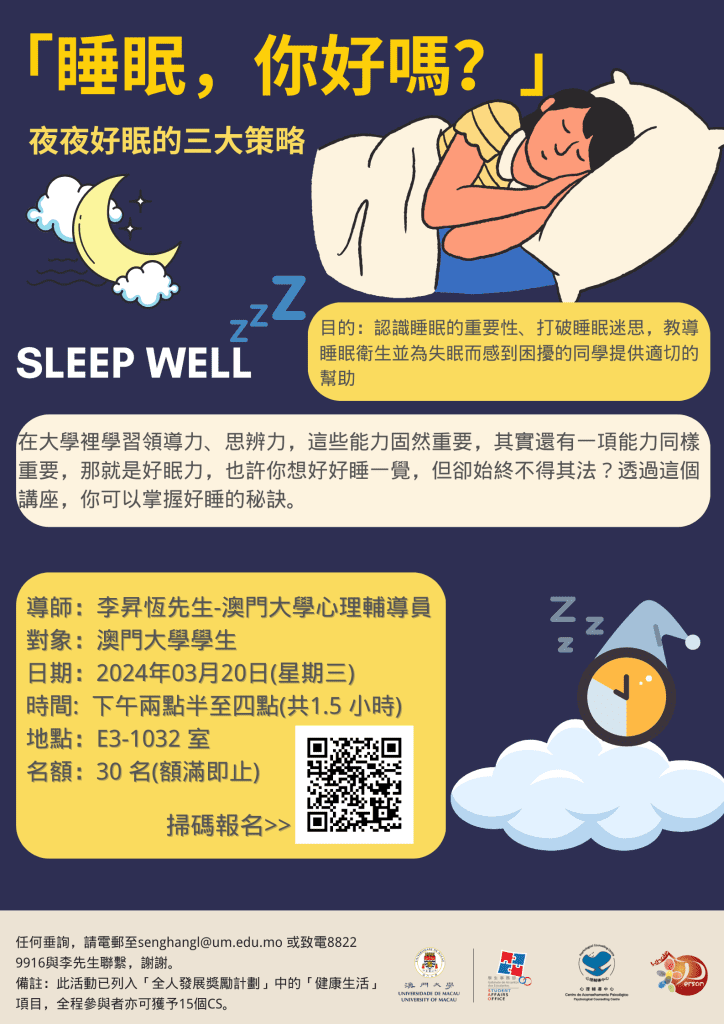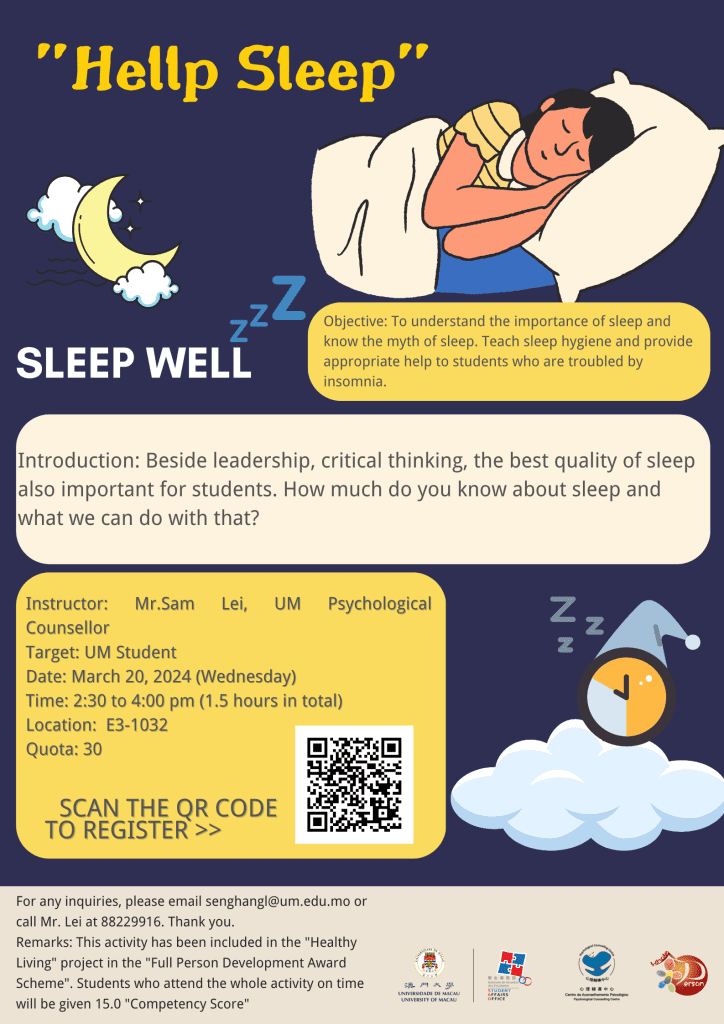[Mental Health Tips] 6 tips for better sleep
[心理健康小貼士] 一夜好眠的六大秘訣
一夜好眠的六大秘訣
文章轉載自https://wellbeing.mohw.gov.tw/nor/pstunt/2/3015
每個人都有睡不好的時候,而我們如何去提升自己的睡眠長度與品質呢?
經過科學證實,以下提供六個秘訣:
- 第一個秘訣是規律,固定時間上床睡覺、起床。規律的睡眠能幫助睡眠建立基礎,同時改善睡眠的長度與品質。在大腦中,有一個精密的睡眠時中,需要在規律的情況下能有好的發揮。
- 第二個秘訣是溫度,保持舒適的溫度。我們的大腦和身體都需要降低核心溫度大概攝氏1度,才會開始睡覺並保持沈睡。這也是為什麼在冷的房間比熱的房間更容易入睡,也建議把臥室溫度調整在攝氏18度高一點。
- 第三個秘訣是黑暗。暗能讓我們釋放一種稱為褪黑激素的賀爾蒙,能調節睡眠的最佳時機。因此上床前一小時,最好暫停使用電腦螢幕、手機或平板電腦,並把房間的亮度減半,我們會發現自己開始想睡。如果可以,也可以戴上眼罩,或是拉上遮光的窗簾,都能幫助我們調整睡眠賀爾蒙:褪黑激素。
- 第四個秘訣是下床,不要醒著待在床上太久。如果你嘗試入睡,但是25分鐘左右都睡不著,或是醒來後也睡不著,會建議下床去做別的事,因為大腦會把睡不著和床做連結,下床可以讓這個連接切斷,也讓大腦學會床是用來長時間睡覺的地方。
- 第五個秘訣是避免酒精和咖啡因,盡量在下午或晚上攝取咖啡因,也不要在睡前喝得太醉。
- 最後一個秘訣是建立起讓自己放鬆的作息,很多人都希望能在夜晚上床、關燈,以為睡覺就是關燈,我們就會馬上入睡,但睡覺並非如此。睡覺比較像是飛機降落,需要花時間讓大腦慢慢沈澱到適合睡眠的穩定基礎上。因此上床前20分鐘或半小時,放下你的電腦和手機,做些能放鬆的事,找出適合自己的方式,並把這件事變成你的作息。
最後,若是受睡眠障礙所苦,像是睡眠呼吸中止症等,這些方法不一定能幫助到你,就像健身教練無法為你治療腳踝的受傷,睡眠也是同理,若你認為自己有睡眠障礙,建議尋求專業人士的協助。
6 tips for better sleep
The article quote from https://wellbeing.mohw.gov.tw/nor/pstunt/2/3015
Everyone has times when they can’t sleep well, so how can we improve the length and quality of our sleep?
According to scientific evidence, here are six tips:
The first tips is regularity – going to bed and waking up at the same time. Regular sleep helps establish a foundation for sleep and improves both the length and quality of sleep. In the brain, there is a precise sleep clock that needs regularity to function well.
The second tips is temperature – maintaining a comfortable temperature. Our brain and body need to lower the core temperature by about 1 degree Celsius to start sleeping and stay asleep. This is why it’s easier to fall asleep in a cool room than a hot one, and it’s recommended to set the bedroom temperature just above 18 degrees Celsius.
The third tips is darkness. Darkness allows us to release a hormone called melatonin, which regulates the optimal timing of sleep. Therefore, an hour before bedtime, it’s best to stop using computer screens, phones, or tablets, and dim the room’s brightness by half. We’ll find ourselves starting to feel sleepy. If possible, wear an eye mask or pull light-blocking curtains to help adjust the sleep hormone melatonin.
The fourth tips is getting out of bed – don’t stay awake in bed for too long. If you try to fall asleep but can’t after about 25 minutes, or if you wake up and can’t fall back asleep, it’s recommended to get out of bed and do something else. The brain will associate not sleeping with the bed, so getting out of bed can break this connection and teach the brain that the bed is for long periods of sleep.
The fifth tips is avoiding alcohol and caffeine, especially consuming caffeine in the afternoon or evening, and not drinking too much before bed.
The final tips is establishing a relaxing routine. Many people hope to go to bed at night, turn off the lights, and think that sleep is just turning off the lights and we’ll fall asleep immediately, but sleep isn’t like that. Sleep is more like an airplane landing, it takes time for the brain to slowly settle onto a stable foundation suitable for sleep. So 20 minutes or half an hour before bed, put down your computer and phone, and do something relaxing. Find a way that works for you and make it your routine.
Lastly, if you suffer from sleep disorders such as sleep apnea, these methods may not help you. Just as a fitness trainer cannot treat your ankle injury, the same goes for sleep. If you think you have a sleep disorder, it’s recommended to seek help from a professional.

